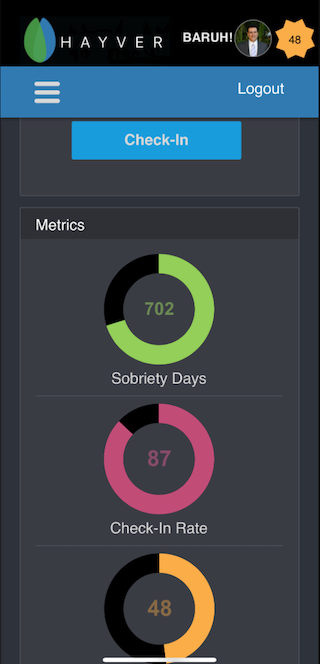 A new alcohol and drug recovery app that incentives users with its own cryptocurrency hit the market this week. Atlanta-based Hayver has just launched its new mobile app that uses behavioral modification and a support network to help people who are living with alcohol addiction.
A new alcohol and drug recovery app that incentives users with its own cryptocurrency hit the market this week. Atlanta-based Hayver has just launched its new mobile app that uses behavioral modification and a support network to help people who are living with alcohol addiction.
“Its foundation is taken from physicians and pilot treatment programs and proven research that [shows] people who submit to random drug and alcohol screens after they have left a treatment center have a much higher chance of being sober, even after five years,” Dr. John M. Copenhaver, Hayver cofounder and chief medical officer, wrote to MobiHealthNews in an email. “Hayver is the only app that provides a psychological deterrent through peer-to-peer accountability and random drug screen[ings] plus a psychological incentive with cryptocurrency rewards (The Duitcoin), not only for the member but to the accountability network as well.”
The app uses daily check-ins and randomized urine tests to help people stay sober. Members sign up for a monthly subscription. Every user has an accountability group made up of five to 20 other members that can be made up of loved ones or others going through a similar situation.
The app displays the user check-in rate and shows how many days the user has remained sober. Hayver is launching its own cryptocurrency called Duitcoin. The coin can be used to purchases services like a subscription from Hayver, and can also be used to donate services to others in need.
“Similar to the Susan G. Komen pink ribbon, the coin can be donated as a symbol of courage, and hope to anyone struggled with life’s difficulties,” Copenhaver wrote.
Users will also get random alerts telling them to test their urine using a provided home testing kit. On testing days they must submit their test results to someone else in their accountability group. A user can decline to take the test, but the accountability group gets a notification if that happens. Typically users get between two and four random tests a month.
Anyone in the accountability network can anonymously order a spot check for someone else in the group if they think the person is slipping. For example, if someone has not checked in for a number of days, this might be an indicator that they are having a difficult time, potentially leading someone in the accountability group to ask for a spot check.
The app gives users the option to start over if they have relapsed.
“Every person coming out of a treatment center or a recovery residence [should] be on [a] peer-to-peer monitoring [program],” Copenhaver wrote. “Only about 2 percent of all people coming out of treatment are monitored. Doctors, pilots, interstate truck drivers [are], and their five year recovery rate is 78 percent. The rest of the 98 percent of all people receiving treatment have no such program until now. Without monitoring, the five year abstinence rate is 3 percent. The discrepancies in recovery rates are tragic; most people don’t stand a chance.”
There are several recovery tools in the digital health space. Notably, in October Digital Therapeutics company Pear got FDA clearance for their app reSET, which treats people with addiction and dependency issues. The therapeutic is a 12-week program, which uses interventions and assessment tools, and the data is then collected into a clinician dashboard.













